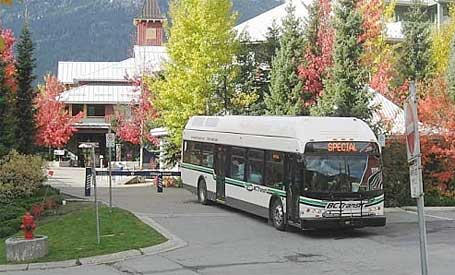
After 4 ½ years of service, the Whistler hydrogen fuel cell bus fleet is calling it quits and bringing with it the British Columbia, Canada hydrogen highway system. The reason for this government shutdown of clean, green public transportation was cited as cost.
So, what is the next step? Backwards, is the next step. The city of Whistler in B. C., Canada will be replacing the fuel cell buses with cheaper diesel-powered buses (what no diesel-hybrids?).
The 20 fuel cell buses will go offline in March of 2014. And, of course since the hydrogen fuel cell bus fleet saved around 2,000 tons of greenhouse gas emissions per year expect to see more coughing, hacking and wheezing in Whistler in the coming months.
One of the costliest aspects of running the bus fleet has been that the hydrogen fuel has to be imported approximately 2,500 miles from the large eastern province of Quebec, to the western province of British Columbia. One would think, however that a local, onsite hydrogen generation system would cut costs significantly.
When BC Transit first started this project, critics thought the folks in Whistler were just Whistling Dixie, and to some extent this could be true. However, by all accounts this fuel cell bus demonstration project has been a huge success.
It’s sad to think that these 20 hydrogen buses will be decommissioned soon and replaced with the status quo diesel buses. I recommend a follow up project – let’s call it Whistler 2.0 – where BC Transit and the other relevant players figure how to keep the fuel cell buses while cutting significant annual costs.
If done correctly, this will be a project that Whistler can sink its teeth into and not only help themselves, but help other fuel cell bus fleets worldwide to survive and thrive.
Related External Resources
https://www.hydrogencarsnow.com/BC-Canada-hydrogen-highway.htm
http://www.bctransit.com/fuelcell/fleet.cfm